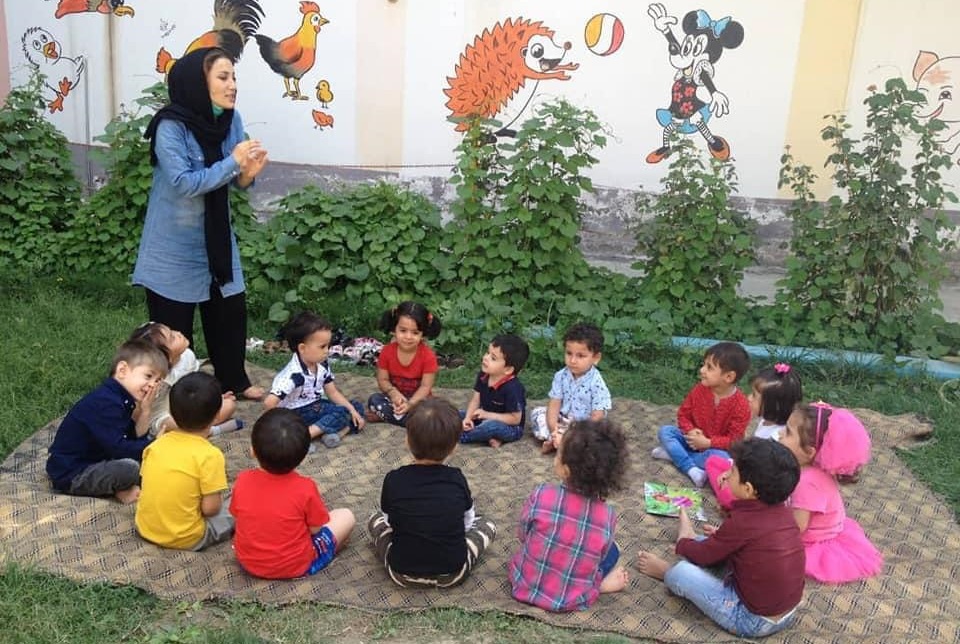KABUL (SW) – Salam Watandar’s research based on interviews with 14 female kindergarten teachers, 12 of whom were employed in public kindergartens and faced dismissal in the last year, reveals that they are grappling with severe economic challenges.
Out of the interviewed women, the 12 kindergarten teachers who are currently unemployed and facing challenging economic circumstances are calling for job opportunities.
Zarina, who was employed as a teacher at the star public kindergarten in Kabul city, has resorted to working as domestic worker after losing her job. She said that she faces additional challenges as her husband is struggling with drug addiction, and she lives alone with her children. Zarina expressed her distress, saying that her dismissal was without any clear reason, and she is currently grappling with severe economic problems.
Sadaf and Fawzia, two more former teachers at Balkh central public kindergarten, each with more than 20 years of service history, also spoke about their dire economic situation following their dismissal.
Sadaf expressed her frustration, stating: “I have been dismissed without any clear reason. There is no hope for us, we are informed that we cannot perform our duties anymore. This situation has left us with a sense of negativity. If the government is willing to assist, there might be hope, if not, I am forced to stay at home. Each of us is the breadwinner for our families, and we have children to feed.”
Fawzia said: “I do not understand why we were dismissed. I wanted to go to the province so that they could hear our voice, but no one permitted it, and no one heard us. We are unemployed. They said there is no permission and no gate has been opened for us so far. This happened in the Department of Labor and Social Affairs. I was the only breadwinner for my family. No one hires women for job anymore.”
The former kindergarten teachers explained that they have not yet qualified for a retirement pension and they are instructed not to work and to stay at home.
Shukriya, another former teacher at a public kindergarten in Balkh, said: “We have been at home for nearly six months, grappling with no income and an uncertain future. Despite the years of service, they have yet to granted us the retirement pension we have requested.”
The interviewed kindergarten teachers in this report further revealed that the government owes them several months’ salary. According to them, the salaries have not been disbursed by the government even in the months leading up to their dismissal.
Rana, one of the former teachers at a public kindergarten in Balkh, expressed her sentiments, saying: “We pursued university education with the intent to serve, but now we find ourselves unemployed and we are now staying at home. For a month, our salary remained with the government, and we received nothing. This has imposed a mental and psychological burden on us.”
Despite these challenges, Samiullah Ibrahimi, the spokesperson for the Ministry of Labor and Social Affairs, acknowledged the dismissal of several female teachers in public kindergartens. He asserted that the ministry has arranged job opportunities for some of these teachers after their dismissal.
However, in an interview with Salam Watandar, the dismissed teachers claim to be unaware of this initiative.

Following their dismissal, a group of governmental kindergarten teachers lamented their dire economic circumstances. This hardship coincides with a substantial decline in the number of students attending both governmental and non-governmental kindergartens, triggered by recent political changes in Afghanistan and the prohibition of women’s employment in governmental and non-governmental institutions. Additionally, several private kindergartens have been rendered inactive.
Nabila, who invested her funds to establish a private kindergarten, said that her kindergarten is no longer operational due to financial constraints. With prior teaching experience in kindergartens and currently unemployed, she expressed frustration over the challenging economic situation she faces.
Likewise, Tamana, a teacher in a private kindergarten in Kabul city, voiced her concerns about the challenging financial circumstances she is grappling with. She expressed dissatisfaction, noting that the income she receives is meager and insufficient to meet the needs of her family.
As teachers in the kindergartens voice their grievances about their living conditions, several women’s rights activists also expressed deep concern, saying that female teachers constitute the most vulnerable group in Afghanistan and consistently face neglect.
Humaira Farhangyar, a women’s rights activist, commented, “Regrettably, in Afghanistan, the weak economic situation subjects everyone to poverty, and teachers are no exception. As the cornerstone of society, they receiv inadequate salaries. If a teacher is not financially stable, it becomes challenging for them to effectively educate the children.”
Nasrin Hamidi, another women’s rights activist, echoed similar concerns, stating: “The situation of teachers is alarming. With a salary that ranges from 8,000 to 9,000 afghanis, they face numerous challenges. Many spend hours waiting at banks only to receive their salaries that are delayed by a month or more. Despite these hardships, they find solace in being able to cover their monthly expenses somehow.”
However, Zabihullah Mujahid, the spokesperson for the de-facto government of the Islamic Emirate, highlighted efforts to address the challenges faced by teachers in schools and kindergartens. He promised that these issues will be resolved shortly.
He added: “It is not only the teachers that are facing challenges; it is a general issue for everyone.” Mujahid expressed hope for improvement in the overall situation and anticipated salary increases for teachers. “The teachers who are unemployed and retired, their needs would be addressed, Inshallah.”






